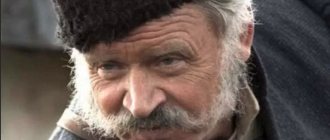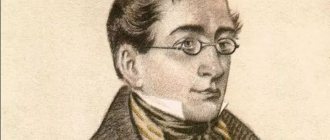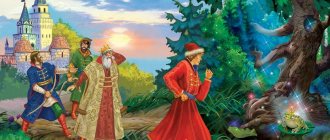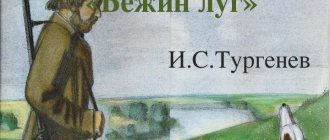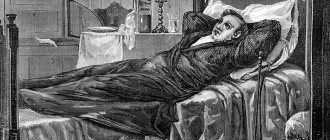Heroism in WWII
“The Fate of Man” by M.A. Sholokhov
. Great Patriotic War 1941-1945 – this is a sad, terrible and incredibly difficult page in the history of our state (and not only ours). However, it is in war that there is always a place for heroism - and with it, heroism. One of these stories (and in reality there were very, very many similar ones) was captured by Mikhail Aleksandrovich Sholokhov in his story “The Fate of a Man.” The main character is Andrei Sokolov. Before the fascist invasion, he had a wonderful family, but the war took away everything that was most valuable from the man. However, Sokolov still had something left - fortitude, unshakable will, kind heart, courage and humanity. At some point, the man is captured by the Nazis. When the concentration camp commandant Müller invites the hero to drink “to the victory of German weapons,” Andrei refuses and drinks instead “to his death and deliverance from torment.” It is also noteworthy that Sokolov ended up with the commandant for his bold and daring statements - he was almost shot. At that moment, news arrived that German troops had occupied Stalingrad - in honor of this, the prisoner was pardoned and even given a loaf of bread and a piece of lard. Andrei Sokolov showed himself as a hero here too - he shared food with his comrades. Thus, the main character of the story “The Fate of Man” is a vivid example of the fact that worthy, noble people, even in war, remain real People and perform feats. They are not afraid of the threat of death, or torture, or deprivation - they are ready to staunchly defend their homeland and their principles. Such heroes serve as examples for the future generation.
“And the dawns here are quiet...” B. Vasiliev
. Boris Vasiliev’s story “The Dawns Here Are Quiet...” is a story about the tragic fates of five girls during the Great Patriotic War. Heroism has no gender. Five girls, Rita, Lisa, Galya, Sonya and Zhenya, who were supposed to find themselves in a quiet and deserted place where there were no battles, by chance are sent on a difficult mission into the forest - to track down the enemy. The small detachment is commanded by Sergeant Major Vaskov. During the campaign, the heroines show incredible fortitude: although they are afraid of bullets and knives, afraid of the hidden enemy and the danger that lurks everywhere, they overcome their fears and doubts. Each of them fulfills her duty and wins a moral victory over herself. At the end of the story, the entire detachment, except for the commander, dies - heroically and selflessly. Young women sacrifice themselves to save their homeland, and they succeed: a detachment of saboteurs is stopped. Thus, B. Vasiliev proved that heroism is an internal state of a person that does not depend on circumstances or gender. The story “The Dawns Here Are Quiet...” imprinted for many years this terrible page in the history of our state and an example of the real feat of real people, so that future generations would remember the heroism of their ancestors and strive to be equally brave and worthy individuals.
“Vasily Terkin” A.T. Tvardovsky
. The poem “Vasily Terkin” by Alexander Trifonovich Tvardovsky inspired many soldiers during the Great Patriotic War. The main character of the work, soldier Vasily Terkin, became the collective image of all Soviet soldiers - brave, optimistic, simple, kind, modest. He swims alone across the icy river to deliver an important message to the other side, and does not even seem to notice that something extraordinary has happened. The author himself writes: “The battle is holy and just. Mortal combat is not for the sake of glory, for the sake of life on earth.” These words describe Vasily Terkin’s attitude towards his exploits - he performs heroic deeds not for the sake of glory and recognition, but out of a sincere desire to protect his homeland and people. Vasily Terkin regularly shows courage, generosity, and selflessness. Thus, pretense, vanity, and greed are alien to true heroism. Real heroes are truly kind, selfless, moral and noble, and it is the desire to help others that motivates them to perform great deeds.
Heroes are all around us
Today, unfortunately, a distorted concept of heroism prevails in the philistine psyche. Modern people are completely immersed in their problems, in their own little selfish world. Therefore, fresh and non-trivial arguments on the problem of heroism are fundamentally important for their consciousness. Believe me, we are surrounded by heroes. We simply don’t notice them because our souls are short-sighted. Not only men perform feats. Take a closer look - a woman who, according to doctors, is unable to give birth in principle - gives birth. Heroism can and is demonstrated by our contemporaries at the patient's bedside, at the conference table, in the workplace, and even at the kitchen stove. You just need to learn to see it.
Heroes in peaceful life
“Matryonin Dvor” by A.I. Solzhenitsyn.
Heroism has a place not only on the battlefield. Heroism is fortitude, it is education, it is moral guidelines, it is a kind heart that remains responsive despite trials, hardships, and failures. We find proof of this statement in the story “Matryonin’s Dvor” by Alexander Isaevich Solzhenitsyn. The main character, Matryona, is called by the writer a “righteous woman.” The world rests on people like her. Matryona is ready to selflessly and selflessly help other people. She happily comes to the rescue, supports, and even does hard work without complaining or grumbling. Moreover, the heroine does not expect anything in return. She does good deeds not for the sake of reciprocal actions, but out of spiritual kindness, in order to please those around her, to alleviate their miserable lot in the post-war village. She truly enjoys the happiness of others. And this dedication of Matryona is a manifestation of true heroism in everyday life. Thus, the story of A.I. Solzhenitsyn’s “Matryonin’s Dvor” serves as proof that heroism is a state of mind and an indicator of one’s moral guidelines and inner strength.
“The Man on the Clock” N.S. Leskov
. The main character of Nikolai Semyonovich Leskov’s story “The Man on the Watch” is a soldier of the Izmailovsky regiment Postnikov. On the night described by the writer, Postnikov stands guard - that is, he occupies the post of sentry. But suddenly he hears a cry for help. According to the charter, the hero has no right to leave his post. Violation results in punishment. Then the soldier is faced with a difficult moral dilemma: to break the rules, but save someone's life, or to remain faithful to the military rules, but perhaps miss the opportunity to help a person who is in trouble. The fact is that there is no certainty that the cries for help are real, that this is not someone’s cruel joke or a cunning trick to lure the sentry from his post. In the end, morality, humanity, and kindness win in Postnikov’s soul - he leaves his post and saves a man who was really in danger. This is a vivid example of true heroism, which is not afraid of either reprimands or punishment. A true hero is ready to sacrifice his own comforts and benefits for the sake of helping other people. And feats are not always appreciated. For example, for the hero of the story “The Man on the Clock,” the story ended very sadly - he was punished for violating the regulations, and a passing officer took credit for his heroic deed. Thus, it becomes clear that heroism does not lie in the number of awards or medals, but in real actions and in a person’s personality.
Heroes of literature: types of heroes and examples
It is human nature to root for someone in every story, so a good book needs a real hero: courageous, brave and selflessly performing feats. Someone like King Arthur, a larger-than-life character and protector, immediately comes to mind.
Heroic deeds are not limited to noble knights, dragon slayers, or fantastical creatures. As in real life, this role can be played by an ordinary guy or girl without visible heroic qualities.
So, let's take a closer look at the world of literary heroes.
6 types of literary heroes
Volunteer Hero
Examples: Tarzan, Hercules, Robin Hood.
They are dedicated to adventure and are not afraid to take risks or sacrifice themselves for the greater good. They always go forward boldly and usually end their journey with a heroic act. The voluntary hero is self-motivated and “feeds” on adrenaline. When everyone else runs away, he stays or immediately runs towards danger.
Unwitting Hero
Examples: Frodo Baggins, Katniss Everdeen, Spider-Man.
The unwilling hero often finds himself without distinctive qualities. And if he has supernatural powers, then either he is afraid to use them, or simply does not know how to do it.
Their journey begins with self-doubt and a desire to return to normal life, so they may even try to run away from the situation.
Unlike the willing hero, he is not enthusiastic about adventure. Maybe passive and needs a little push from the outside. But once this hero begins his heroic duty, he will overcome obstacles and achieve the ultimate goal.
Tragic hero
Examples: Oedipus, Macbeth, Romeo.
A tragic hero is a character who has all the virtues of heroism, but who usually has a character flaw (such as excessive pride).
Aristotle is considered to be the first to define the tragic hero in his Poetics. The Greek philosopher believed that a good tragedy should evoke fear and pity. And it is the tragic hero's flaws and failures that make them interesting and evoke an emotional response.
Classic hero
Examples: Harry Potter, Hercules, King Arthur.
The classic hero is a long-standing literary concept much like the willing hero. Just open a book on Greek mythology and you will find classical heroes endowed with excellent traits: courage, strength, intelligence and determination.
They always follow the virtuous path and want to do the right thing, and they are the ones you can bet on because they never fail.
Epic Hero
Examples: Beowulf, Siegfried, Odysseus.
An epic hero reflects the values and beliefs of his culture and uses extraordinary or superhuman abilities to achieve great goals. In its earliest form, the epic hero was the protagonist of an epic poem.
His glorious deeds are known to everyone, but before international fame, an epic hero must be a legend in his culture. It is selfless and intended for another country or people.
Antihero
Examples: Hamlet, Billy the Kid, Jack Sparrow.
Antiheroes are far from the role models we associate with heroes, but they are often driven by a sense of justice. This character is contradictory and has unclear moral principles, and this is what makes him realistic, complex and even likable.
The anti-hero is not a villain and will eventually do the right thing, proving that he always had a heroic heart inside him.
Memorable heroes in literature
Robin Hood, Robin Hood, M. Gershenzon
It's safe to say we're all familiar with the story: Robin Hood is a rebel and noble thief who steals from the rich to give to the poor. But that's not the only reason the outlaw hero was popular; Robin Hood and the Merry Men - heroes of the people, fought for the common people, and opposed the oppressive Norman lords, which can be seen as a classic example of the confrontation between good and evil.
Don Quixote, Don Quixote: the brilliant gentleman from La Mancha Miguel de Cervantes
In reality, Don Quixote is a middle-aged gentleman who becomes so engrossed in books about chivalric romance that he convinces himself that he is a noble knight with the idealistic goal of making the world a better place through chivalry. The protagonist of the first modern novel did not kill animals or win epic battles; he won something better—the hearts of the people.
Frodo Baggins, The Lord of the Rings, J. R. R. Tolkien
“Even the smallest man has the power to change the course of the future,” wrote the great J. R. R. Tolkien, and Frodo Baggins truly is his embodiment. Without any otherworldly powers, gifted only with common sense and a kind heart and burdened with self-doubt, his hero nevertheless became the Bearer of the Ring, the Hobbit who passed through Middle-earth to destroy the source of evil. Single ring.
4. Jo March, Little Women by Louisa May Alcott
Jo, the second eldest of the March sisters, is an outspoken, brave and independent girl. She also has an adventurous spirit, a sharp tongue, a fierce temper, and a great passion for writing stories. What the tomboy heroine doesn't have is patience for the many restrictions placed on women of her time. Jo wanted nothing more than to save her family.
Lisbeth Salander, The Girl with the Dragon Tattoo by Stieg Larsson
Lisbeth is a cultural icon and a very complex character. Is she an action heroine? Anti hero? Victim? Avenger? Lisbeth combined everything in herself. The heroine with a painful past has extensive hacking skills and is partial to victims of abuse, especially women. Despite her isolated existence, she challenges and helps journalist Mikael Blomkvist uncover a dark murder mystery.
Author: Pecherskaya M.A., Chief Librarian, Department of Information Environment Development
What is heroism?
“Old Woman Izergil” M. Gorky
. The heroine of Maxim Gorky's story "Old Woman Izergil" tells the story of a true hero. The old woman Izergil shares the legend of Danko with the traveler. Once upon a time, a very, very long time ago, one tribe drove another, weaker tribe of people into the depths of the forest. But the moment came when, due to the increasing frequency of diseases and lack of resources for life, people decided to get out of the thicket - it was necessary. However, on one side they were surrounded by a strong enemy, and on the other - impassable jungle of trees and other plants. Then there was a daredevil among them named Danko. He offered to go through the dense forest under his leadership. The tribesmen believed Danko and followed him. The hard and long journey tired people. But they did not want to admit their own powerlessness and fatigue, so they began to reproach the brave Danko for proposing the wrong solution. Moreover, the travelers wanted to kill the young man. But in the hero’s heart the fire of kindness, responsiveness, nobility, selflessness and incredible sympathy for his fellow tribesmen continued to burn. He sincerely wanted to help them and ease their suffering. Then he “teared his chest with his hands,” took out his brightly flaming heart and illuminated the remaining path with it. Soon the dense forest ended, and people saw the beautiful steppe. Danko laughed joyfully and died. This is an example of extraordinary heroism - selfless and sincere. Despite the hatred of the people, their vile thoughts, words and intentions, Danko truly wanted to help people, save them, reduce their pain.
"Taras Bulba" N.V. Gogol.
Nikolai Vasilyevich Gogol’s work “Taras Bulba” focuses on the Don Cossacks who defend their homeland from the Polish invasion. Taras Bulba - after whom the story is named - is a real hero. In battles, Taras shows remarkable courage and fortitude. He performs a heroic act even before his death - when he finds himself captured by the enemy, chained to a tree with iron chains, when the fire is about to take his life, Taras Bulba manages to shout to his comrades where to move in order to avoid danger and hide from his enemies - after all from the height at which he is located, he can see the escape route better. The Cossacks manage to break away from the enemy and escape. Thus, there is no doubt that heroism is a state of mind; it is never temporary. The hero will find a way to help others, even when he himself is one step away from imminent death.
"Borodino" M.Yu. Lermontov.
Examples of heroism can be found not only in prose, but also in lyrical works. For example, Mikhail Yuryevich Lermontov’s poem “Borodino” is dedicated to the events of the Patriotic War of 1812 and its heroes. The poet writes: “Yes, there were people in our time, not like the current tribe: The heroes are not you!” Next, the author describes the feat of the soldiers who defended Moscow for a long time, and then made the difficult but necessary decision to leave the capital. Let us remember the following lines: “And we promised to die, and we kept the oath of allegiance in the Battle of Borodino.” Thus, heroism lies in the selfless desire to defend one’s fatherland, one’s people and all those who need this protection and help. The hero is not frightened even by the threat of death - just like, for example, the soldier in the poem by M.Yu. Lermontov. Of course, war is not the only place where a person can perform a heroic deed. However, such actions definitely go down in history, because the lives of a huge number of people and the fate of an entire state are at stake. This is a great responsibility, and taking it upon oneself is also heroism. And leaving Moscow was an even more difficult and extremely responsible decision. But the poet proudly declares about the outcome of the battle: “it was not for nothing that Moscow, burned by fire, was given to the Frenchman.”
Henryk Sienkiewicz's arguments
The image of Jesus in an aura of courage also appears in Henryk Sienkiewicz’s novel “Kamo Gradesi”. Bright finds the Polish literary classic shades to create a unique plot situation in his famous novel.
The Apostle Peter, after Jesus was crucified and resurrected, came to Rome, following his mission: to convert the Eternal City to Christianity. However, he, an unnoticed traveler, as soon as he arrived, witnesses the ceremonial entry of Emperor Nero. Peter is shocked by the Romans' worship of the emperor. He does not know what arguments to find for this phenomenon. The problem of heroism, the courage of a person ideologically opposed to the dictator, is illuminated, starting with Peter’s fear that the mission will not be completed. He, having lost faith in himself, runs away from the Eternal City. However, leaving the city walls behind, the apostle saw Jesus in human form coming towards him. Amazed by what he saw, Peter asked the Messiah where he was going: “Where are you coming?” Jesus replied that since Peter had abandoned his people, there was only one thing left for him to do - to go to the crucifixion a second time. True service certainly requires courage. Shocked Peter returns to Rome...
True and false heroism
"Sotnikov" V.V. Bykov.
Vasil Bykov’s work “Sotnikov” raises a complex but important question about imaginary and real heroism. According to the plot, two soldiers - Rybak and Sotnikov - are sent on a mission during the Great Patriotic War. Sotnikov did not inform his superiors about his poor health, but on the way the man only gets worse, he is afraid of becoming a burden to his comrade. And it seems that Rybak is accomplishing a real feat, not abandoning his friend in trouble, returning for him. Sotnikov, on the contrary, has no malicious intent, but still betrays both himself and his comrade to the enemy, coughing loudly. But the true intentions, the real essence of these two heroes are revealed only at the end of the book, when both are captured by the enemy. It’s not for nothing that the work is called “Sotnikov”, and not “Fisherman”, for example. This already gives rise to the reader’s idea that the characters will turn out to be not at all what they initially seemed. In captivity, awaiting his fate, Sotnikov is confident in his principles, he firmly knows that he will never betray the partisans, will not say anything that could help the enemy win. Rybak behaved differently: he decided to cooperate with the enemy and agreed to serve the enemy police. The next morning Sotnikov was executed. But he died as a hero. Thus, heroism is the ability to remain true to yourself and your principles, even when danger threatens. Heroism means defending your homeland, your people, your interests and defending your principles with all your might and until your last breath. For a real hero, even death is not scary if we are talking about the fate of his fatherland and people.
“War and Peace” L.N. Tolstoy.
The problem of false and real heroism also appears in Leo Tolstoy’s epic novel “War and Peace” (although it is probably difficult to find a topic that the writer would not touch upon in this truly significant work of Russian classical literature). The reader sees Zherkov - he is a real coward and a traitor, but he is not a hero. He chases orders and awards, praise and glory, but does not strive to accomplish feats at all. And he’s not at all eager to fight. He was even kicked out of one regiment, but Zherkov miraculously managed to get a job as an orderly for Bagration himself. Another character who attracts attention is company commander Timokhin. He is modest and simple. But with his brave deeds, Timokhin inspires the soldiers of his company to heroic achievements - they attack the French and throw the enemy back some distance, gaining time. Thus, heroism does not always manifest itself in the number of awards. True heroism lies in actions, in deeds, in the desire to protect and help free of charge. The shine and ringing of a real hero is often not at all in the shining orders, but in the blades that clash against each other on the battlefield.
Author: Maria Serbina
The literary image of God is like a tuning fork. Pasternak and Bulgakov
Sacrifice distinguishes true heroism. Many brilliant literary classics are trying to influence the beliefs of their readers, raising the bar for understanding the essence of heroism as high as possible. They find creative strength to uniquely convey to readers the highest ideals, telling in their own way about the feat of God, the son of man.
Boris Leonidovich Pasternak in Doctor Zhivago, an extremely honest work about his generation, writes about valor as the highest emblem of humanity. According to the writer, the problem of true heroism is revealed not in violence, but in virtue. He expresses his arguments through the mouth of the protagonist’s uncle, N.N. Vedenyapin. He believes that the beast dormant in each of us cannot be stopped by a tamer with a whip. But this is within the power of a self-sacrificing preacher.
A classic of Russian literature, the son of a theology professor, Mikhail Bulgakov in his novel “The Master and Margarita” presents us with his original literary interpretation of the image of the Messiah - Yeshua Ha-Nozri. The preaching of Good with which Jesus came to people is a dangerous business. Words of truth and conscience that go against the foundations of society are fraught with death for those who utter them. Even the procurator of Judea, Pontius Pilate, who, without hesitation, can come to the aid of Mark the Rat, surrounded by the Germans, is afraid to tell the truth (at the same time, he secretly agrees with the views of Ha-Nozri.) The peaceful messiah courageously follows his destiny, and the battle-hardened Roman commander is cowardly. Bulgakov's arguments are convincing. The problem of heroism for him is closely connected with the organic unity of worldview, worldview, word and deed.


